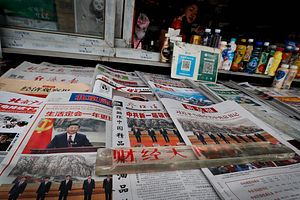In China, a peculiar tool for transmitting political messages has evolved under the rule of the Chinese Communist Party (CCP): homophonous pen names. These pseudonyms at first glance look like an individual author’s name, but in actuality are homophones for specific CCP regime organs. Our recent research article, published in Asia Policy, shows that an entire entourage of pseudonyms authoritatively propagate the views of given Party departments.
The reason for this unique system’s development is strongly related to the failures and inadequacies of the CCP’s more traditional forms of commentary. Such commentary once was the primary vehicle for transmitting the Chinese leadership’s views and directives to the Chinese citizenry and Party membership alike. Until the 1980s, editorial content published in Party mouthpiece People’s Daily (PD) transmitted the Party line to a captive audience through reprints in local Party papers and even state broadcasts over radio and television.
But the good old days for CCP propagandists have since passed. The reality is that most Chinese long ago moved on to read news from the multitude of information sources made available by the commercialization of China’s media, which took off along with China’s reform and opening up period. These non-Party sources offer more content variety and even more accurate reporting on sensitive stories such as law enforcement abuses, public health emergencies, corruption scandals, and other crises; as a result, the Chinese public learned to ignore arrogant commentaries in favor of media outlets that relied on their patronage. This perceived problem was only exacerbated by the advent of the internet and social media platforms. In fact, Party propagandists frustratingly refer to the current period as the era of “everyone having a microphone,” recognizing that they must now effectively compete with average citizens to put forth “correct” opinions or risk losing control of any given event’s national narrative. Such a challenge is no small matter for China’s leadership, as a loss of its monopoly on opinion setting seriously undermines its ability to counter views that threaten its legitimacy and power.
The below quote represents a candid admission in 2009 by former PD deputy chief editor Mi Bohua on his paper’s failure to attract readers of its highly authoritative commentary, which directly represents the views of the CCP Central Committee — the center of political power in China:
Readers have largely reflected that the party’s political commentary has a lot of empty talk, boastful talk, meaningless talk, and bureaucratic talk; they wish that viewpoints were a bit more original, the writing style a bit more fresh, and the form a bit more lively.
The perceived solution to this commentary conundrum was to make regime commentary vehicles as diverse as its non-Party competition, thus leading to the development of commentary pseudonyms.
To be sure, pseudonyms have been used by CCP members since before the establishment of the People’s Republic of China, but its current incarnation and renewed importance evolved following the Chinese military’s Tiananmen Square crackdown in 1989 and the leftist resurgence that followed. At the behest of Deng Xiaoping, whose waning influence over China’s propaganda apparatus threatened the very survival of his reform-oriented policies, the Shanghai Party Committee mouthpiece Liberation Daily created a small writing group in 1991 — consisting of the Party secretary of the newspaper Zhou Ruijin and two of his colleagues — to author pro-reform commentary under the pen name “Huangfu Ping.” As was later revealed, the pen name stood for “receive the people’s order to assist Deng Xiaoping” (奉⼈民之命辅佐邓⼩平). Today, CCP bylines like “Ren Zhongping” (任仲平), “Zhong Zuwen” (仲祖文), and “Guo Ping” (国平) each represent Party organs: PD, the Central Organization Department, and the Cyberspace Administration of China, respectively.
In conclusion, this system’s continued development since the early 1990s offers an authoritative resource for CCP views, and serious China watchers would do well to tune in. In combination with analysis of leadership statements, the systematic analysis of all forms of authoritative commentary can help observers better understand the official positions of the CCP.
David Gitter is the director of the Party Watch Initiative, a program of the Project 2049 Institute that analyzes the writings and activities of the Chinese Communist Party.
Leah Fang is a researcher at the Party Watch Initiative and a China specialist at Kroll Associates.

































